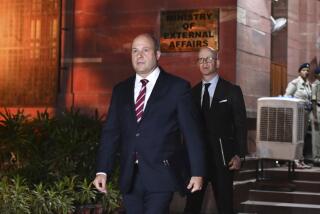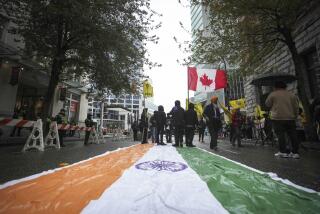Soviets Expel 25 British Citizens in Retaliation
- Share via
MOSCOW — The Soviet Union on Saturday ordered the expulsion of 25 British Embassy staffers, journalists and businessmen in retaliation for Britain’s expulsion two days earlier of 25 Soviet citizens accused of spying.
British Ambassador Brian Cartledge said he was summoned to the Foreign Ministry on Saturday afternoon and told that the 25 Britons were being ordered to leave the country on the ground that they were engaged in “activities incompatible with their official status,” a diplomatic euphemism for espionage.
Cartledge said he categorically denied the accusations and protested the Soviet move “in the strongest terms.”
Largest in Years
Saturday’s action is believed to involve the largest number of resident Westerners that the Soviet Union has expelled in more than a decade.
British Foreign Office officials in London and British diplomats in Moscow said they were stunned by the dimension of Moscow’s action. Since London’s expulsion of 25 Soviets on Thursday, Foreign Office officials had said privately that some form of retaliation was probable, but they expressed belief that the action would be relatively minor.
There is precedent for such a low-key response. When Britain expelled a record 105 Soviet citizens in April, 1971, on charges of spying, Moscow retaliated by ousting only 18 Britons.
A Foreign Office source Saturday called the Soviet move “downright vicious” and said that it would further strain Anglo-Soviet relations.
In a formal statement, British Foreign Secretary Geoffrey Howe strongly condemned the Soviet action. There was no immediate retaliation, however.
Setback to Relations
“We are now giving urgent and careful consideration to the implications,” Howe said in a prepared statement. “We have consistently made clear our wish for improved political and commercial relations with the Soviet Union and have worked hard for that, but this Soviet action, for which there is no objective justification whatsoever, is bound to set back that process.”
Prime Minister Margaret Thatcher--after meeting Mikhail S. Gorbachev in December, 1984, not long before he became the top Soviet leader--said she found that they “could do business together.”
The 25 British citizens ousted Saturday were given three weeks to leave the country, the same amount of time that Britain set Thursday when it expelled the 25 Soviet Embassy staff members, trade officials and journalists.
When it announced the Soviet expulsions, Britain said it was acting on information supplied by Oleg A. Gordievski, a Soviet diplomat identified as the London “resident,” or chief of KGB espionage operations, in Britain. In what is regarded as the most important British intelligence coup in two decades, Gordievski, 46, defected in London and has been granted political asylum.
Copenhagen Connection
Danish officials have said that Gordievski began cooperating with Danish and other Western intelligence agencies as early as 1966, only four years after he joined the KGB in Moscow. It is unclear why Gordievski decided to end his career now by defecting, but there have been reports that he was soon to be reassigned to Moscow.
Western diplomats in Moscow, in expecting the Soviets to take only token action against the British here, assumed the Kremlin would mainly seek to save face. Diplomats noted that when France expelled 47 Soviet officials for spying in 1983, Moscow took no retaliatory action at all.
The 25 Britons ordered out of the Soviet Union include 18 embassy staff, five journalists and two businessmen. The most senior diplomat on the list is the current Viscount Asquith, a first secretary who specialized in the Soviet economy. Two other first secretaries, two second secretaries, two vice consuls and five attaches were also ordered to leave. Six other embassy staffers on the list are administrative and technical personnel who do not hold diplomatic status.
By contrast, only six of the Soviets ordered out of London were diplomats. The harsher Soviet action effectively decimates the British Embassy’s political section and its communications staff. Four of the diplomats ordered out are political officers, and five are highly skilled communications technicians.
The five expelled British journalists include some of the most experienced members of the Western press corps in Moscow. They are Dennis Blewett of the Daily Mail; Mark Frankland of the Observer; Robin Gedye, Daily Telegraph; Alan Philps, Reuters, and Tim Sebastian, a television correspondent for the British Broadcasting Corp.
The two businessmen are Simon Priestley, head of the Moscow office of Quest Automation Ltd., a computer products firm, and Roger Wood, who represents C.M. Golodetz (Overseas) Ltd., a London-based company specializing in chemicals and machine tools that has traded with the Soviet Union for almost 60 years.
‘Hostile, Poisonous’
In informing Cartledge, the British ambassador, of the ouster, Vladimir P. Suslov, chief of the Foreign Ministry department that deals with British affairs, read a statement saying that Britain’s action two days earlier was “hostile and designed to poison Anglo-Soviet relations.”
Cartledge said he replied that the accusations of improper activity against the 25 Britons were “totally unjustified and wholly without foundation.”
The ambassador said he protested the expulsions in the strongest terms and categorically denied that any of the 25 had been engaged in “improper activities of any kind.”
In London, the government also announced Saturday that the Cabinet minister for Scotland, George Younger, had canceled plans to lead a Scottish industry development delegation to Moscow today. The delegation itself still planned to make the trip.
British officials had tried to contain damage both to their ties with Moscow and to the delicate general state of East-West relations in the critical period before November, when President Reagan is to meet Gorbachev in Geneva. The British had categorized the Gordievski affair as a separate issue.
London’s initial statement announcing the Soviet expulsions contained a reference to the importance of maintaining “a realistic dialogue” with Moscow, and Foreign Secretary Howe stressed the importance of building confidence into East-West ties.
The three weeks’ time given the expelled Soviets to leave Britain and a simultaneous announcement that the Kremlin would be allowed to increase the total number of diplomats that it bases in London were also aimed at softening the political impact of the expulsions, but the efforts appear to have had little effect in Moscow.
Times staff writer Tyler Marshall contributed to this story from London.
More to Read
Sign up for Essential California
The most important California stories and recommendations in your inbox every morning.
You may occasionally receive promotional content from the Los Angeles Times.













